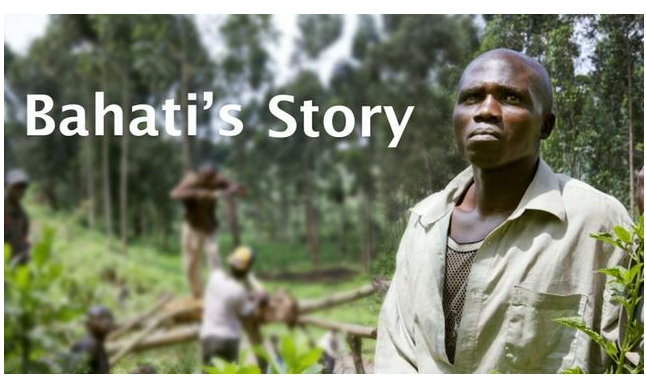“We never knew”
Written by duckrabbit(click on photo, the video player will load, then click again to play)
It’s one of those moments you don’t forget.
This term I’ve been a guest lecturer at Birmingham City University. I sat twenty students down in front of one of the four videos we’ve been producing for MSF (more of that in a minute) and pressed play …
The response was terrible.
At the end nobody wanted to say anything. Not a single comment. Just a shattering silence and unease as the class shuffled out the door.
Over the last couple of months duckrabbit has been working with Robin Meldrum from MSF (audio) and the photographers Martin Beaulieu Julie Remy, Yasuyoshi Chiba, and Dominic Nahr , to record and produce four videos for the final chapter of their Condition Critical website.
The idea has been to bring awareness to the terrible conflict in the East of the Congo.
A lot of famous photographers have made their names in this patch of the world. We are often exposed to their black and white images that have no doubt played an important role in sharpening minds to the conflict but also reinforce negative stereotypes about the dark continent. There’s undeniable beauty and depth in the work of photographers like Marcus Bleasdale but all too often photo editors, in their insatiable blood lust for the edge, pick out the most despairing shots. Even Bleasdale takes ‘darkness’ as the title of his book.
Ultimately, out of context, these singularly negative images have become a cliched, two dimensional and self defeating form of journalism, because all they ask of us is to pity these wretched people and admire the artistry of the photographer.
I would like to think that duckrabbit’s work with MSF goes some way to showing that these people neither ask, nor need your pity.
The name and style of the photographer is the last thing we hope people think about when watching our work.
Over the next few days I’ll be popping the videos up for you to have a look at. MSF hoped that they would prompt people to leave a message of support for the people of Eastern Congo on an interactive map on the Condition Critical Website. Sounds a bit daft doesn’t it? Surely what they need is cash, right?
Well first off if you watch the videos you can find out a little about their lives, that they’re not that much different to you and me except that they’ve been caught up in an unforgiving conflict. Secondly messages of support do make a difference. I know this because last year I worked in camps in Kenya and the thing that people were most frightened of was being forgotten, the sense that no-one cared. That’s what leads to depression and despair. Worse than that, when no-one cares people get away with murder, literally.
So the fact that MSF will take these messages and share them in the camps and clinics will make a difference. It will also give a huge morale boost to the MSF staff working in Eastern Congo.
So If you’ve enjoyed reading duckrabbit blog over the last year and if you’re moved by any of the video’s please let us know what you think and then go and leave a message of support on the map. That’s exactly what many of my students who so silently watched the video in class did. They obviously needed time to take in what they’d seen.
One of them sought me out privately afterwards to say:
‘”We were shocked. Not by the video but because we never knew.”
Please feel free to embed this video on blogs, and facebook and twitter the Condition Critical Website.


Discussion (3 Comments)
Good point! I truly believe that this is one of the important messages: That one of the worst things for the people in areas like the DRC or many other war/crisis areas is to have the feeling to be forgotten. To give them a voice might not change their situation, but at least it is a chance to let other people know about it, what might make it easier. This has been my experience all over the place, no matter if it was in the DRC, in India or as recently in Rwanda. Giving them a voice is the first thing to empower them.
I guess, when talking about b/w (i’m a big fan of it…), we directly put it in context of crisis and a dark atmosphere. What has it’s right to exist with pictures out of areas in crisis to a certain extend. What in my mind is sometimes more important is that we as photographers creating the stories don’t forget about the people. This is not about artsy fartsy photowork, this is about telling the stories of people who would have no voice otherwise. And giving them a voice by letting them talk by themselves is a first step, what is in my mind also more respectful to their situation.
Anyway, thanks for your work. Good to see that the situation in the DRC get’s attention.
All the best, Simon
Thankyou Benjamin.
Thanks Simon … I hope to write more on this.
You hit the nail on the head,
‘Give them a voice’.
Really, honestly, it shouldn’t be that hard, should it?